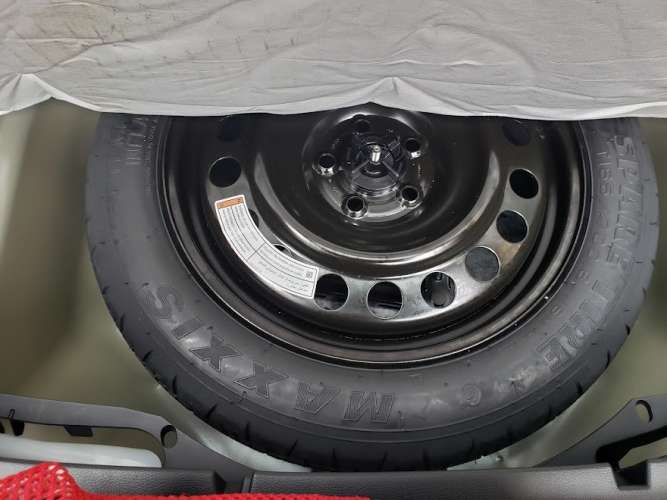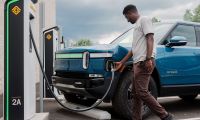As more and more automakers delete spare tires in order to save a few pennies or extend the range of an EV by six feet, the consumer is the one left out in the cold when a tire is damaged. Michelin offers an interesting solution to this issue. Its Primacy Selfseal tires can plug a puncture as soon as it happens.
Related Story: Ford's Explorer Offers the Best AWD SUV Flat Tire Management System Available
What Are Michelin Primacy A/S Selfseal Tires?
Michelin’s self-sealing tires contain a layer of sealing material inside the tire. In the event of a puncture, the self-sealing material will help to prevent the tire from going flat. Michelin says that the technology can seal up to 90% of summit tread punctures up to ¼” in diameter. In other words, a puncture from a typical nail in the tread area, but not the area of the tire adjacent to the sidewall. We tested all-season touring tires on the 2021 Ford Explorer XLT.
How Do Michelin Primacy A/S Selfseal Tires Work?
Michelin says that the tire will lose air following a puncture, just not rapidly. The company’s guideline is about 15 PSI per week. Your vehicle’s Tire Pressure Monitoring System (TPMS) will alert you to the slow loss of pressure.
Can Michelin Selfseal Tires Be Repaired?
So you had a puncture and the Michelin Selfseal tires did their job. What then? The owner can inflate the tire temporarily and have it repaired at a qualified tire repair facility. We reached out to Michelin and confirmed that this was correct. Michelin’s spokesperson told us, “We always recommend an expert see the actual puncture first to make sure it's not something unusual.” The tire is designed for nail and screw punctures, not catastrophic damage as might occur if one strikes a curb at speed. Here is a video that shows how such tires can be repaired by an independent source.
How Much Do Michelin Primacy A/S Self-Seal Tires Cost?
We priced out two Michelin Primacy tires. One with and one without the Selfseal technology. We used the Explorer’s larger optional wheel size of 255/55/20. Tire Rack lists the tires at $205 for the conventional tire type and $262 for the Selfseal-equipped tires. So the premium is roughly $55 per tire. Interestingly, Ford charges $195 for the addition of these special tires. There is no added Ford markup on the cost of the tire, just the actual retail cost difference.

Stop Debating If a Spare Is Better
We would understand if a reader immediately jumped to a mental debate about whether a spare tire or Selfseal-equipped tires are the better choice. However, Ford does not make you choose. The compact spare is still in the vehicle.
We drove about 300 miles on the Michelin Primacy A/S Selfseal tires in a wide variety of situations including highway, rural dirt roads, city traffic, and suburban streets. We found that the Michelin Primacy A/S Selfseal tires offered an extremely smooth ride and were much quieter than typical tires to our subjective ears. Those who are seeking a solution to frequent punctures should opt for the Michelin Selfseal tire when given the choice. We found only upsides to the technology. Now, if Michelin would just combine this technology with its amazing CrossClimate2 advanced all-season tire design…
John Goreham is a long-time New England Motor Press Association member and recovering engineer. John's interest in EVs goes back to 1990 when he designed the thermal control system for an EV battery as part of an academic team. After earning his mechanical engineering degree, John completed a marketing program at Northeastern University and worked with automotive component manufacturers, in the semiconductor industry, and in biotech. In addition to Torque News, John's work has appeared in print in dozens of American news outlets and he provides reviews to many vehicle shopping sites. You can follow John on TikTok @ToknCars, on Twitter, and view his credentials at Linkedin
Re-Publication. If you wish to re-use this content, please contact Torque News for terms and conditions.
Set as google preferred source












Comments
It's a nice option to have
Permalink
It's a nice option to have this feature available from the tire manufacturer. I had to repair 4 nail/screw punctures so far this year, and happily they were all slow leaks and the tire repairs were covered by an added tire warranty that I bought when buying the tires. I don't like fix-a-flat, spray in tire goo, because it can cause a tire imbalance, and often the tire cannot be patched/repaired afterwards.
Having just bought a Bolt
Permalink
In reply to It's a nice option to have by DeanMcManis (not verified)
Having just bought a Bolt with these tires and no spare, I have been trying to figure out my best solution to dealing with tires. I've decided to keep the self-sealing tires and add a full size spare with the same tire. Since the existing tires still have a reasonable amount of tread, I'll run them until they need to be replaced, but I am not comfortable without a spare, and it really needs to be the same tire that is on the car if a flat occurs on the front because of the way the electric motor is connected to the wheels. So I will buy one Michelin self-sealing, put it on a Cuze wheel of the same size, and carry it as a spare, and replace with the same tire so if my wife picks up a nail, she may not have to change a tire. Best of both worlds. The performance of the tires is good enough for me, and peace of mind is more important.
Check out Modern Spare. They
Permalink
In reply to Having just bought a Bolt by Dan Abbott (not verified)
Check out Modern Spare. They may have a solution that works well for you. Good luck, Dan.
Check your trunk space avail,
Permalink
In reply to Check out Modern Spare. They by John Goreham
Check your trunk space avail, sizes avail won't fit many cars. Would't fit my QX 30 will have to go with self sealing, if I can find them!
Hi to all, how is the whole…
Permalink
Hi to all, how is the whole thing, I think every one is getting more from this web site, and your views are nice designed for new visitors.